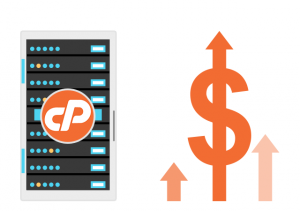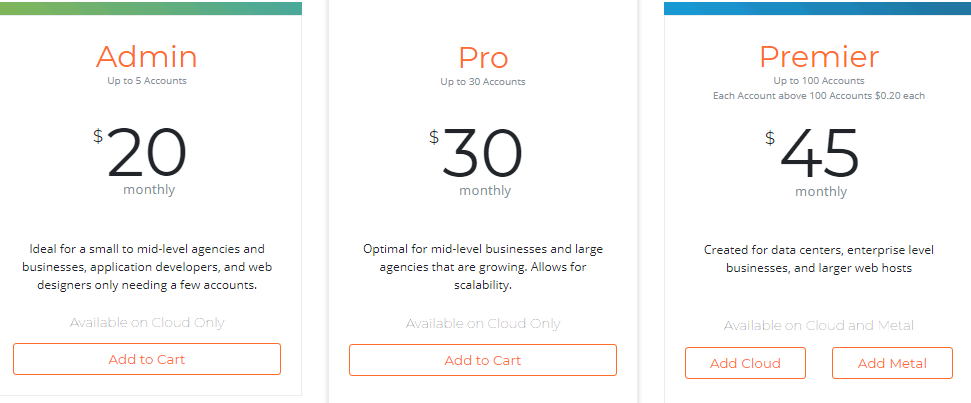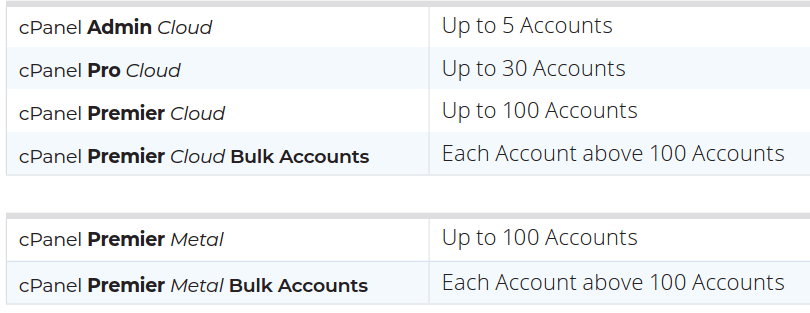Forthcoming cPanel licence price hike and account-based pricing. What comes next?

cPanel has recently astounded the web hosting industry by announcing a shocking change to the cPanel licensing and pricing model.
The company has announced a brand-new license structure and a per-account billing format, which will cause a massive price hike to the entire cPanel-based web hosting industry. This will affect shared hosting, reseller hosting, VPS and dedicated server business models etc.
Read further for more information on the upcoming dramatic changes and how it will affect our cPanel-based services.
What are the new cPanel licence changes about?
It all started last Thursday, June 27, when cPanel took their authorized partners and associated vendors by surprise with an email notification about a forthcoming licence and pricing structure change.
Here is an excerpt of this announcement that sums the changes up:
Our pricing and licensing structure will now be standardized for all of our customers and include multiple Tiers. This new structure defines the price of each license based on the number of Accounts hosted on the server, reflecting the value received by the owner; now, customers pay for only what they use. On September 1st, 2019, we will introduce Auto-Scaling Packages, Fixed Packages, and transition all existing monthly licenses to the new account based pricing and licensing structure.
All in all, cPanel are introducing a new licensing account tier structure which will raise flat licence cost significantly.
What’s more alarming, however, is the billing model change that comes with that.
With this change in force web hosting providers will now be billed on a per-account basis for both active and dormant accounts, instead of covering a flat, server-wide licence fee.
Here is what the new cPanel license packages will be like:

As you can see, cPanel has introduced a new account tier structure which includes 3 types of setups based on the number of accounts included:
Admin – up to 5 accounts
Pro – up to 30 accounts
Premier – up to 100 accounts
Premier Bulk Accounts – 101+ accounts; each additional cPanel account is charged separately on a monthly basis;
The Admin and Pro tiers are fixed meaning that the user will need to upgrade to a higher account tier if they need to create more accounts on the server.
The licence type has been changed as well. The popular cPanel & WHM VPS and cPanel & WHM dedicated packages have been changed to Cloud and Metal, respectively. The cPanel solo package has been terminated.
When buying a cPanel package, the user will be able to choose between different combinations of account tiers and license types, as follows:

The Cloud license type can be combined will all account tiers while the Metal licence is only fit for the Premier and the Premier Bulk Account tiers.
How will the new change affect the web hosting market?
So far, the cPanel licence has allowed hosts to accommodate an unlimited number of accounts on a single server for a reasonable monthly price.
Judging from experience, an average web hosting provider would usually accommodate around 500 accounts on a single, sufficiently powerful server.
Obviously, this new price model would raise the licence cost for web hosting providers drastically.
It may lead to a whopping 1000% cPanel licence cost increase per server and will almost equal the server’s hardware costs.
Also, this new model has added an extra layer of effort for the providers.
Now, they will have to figure out a way to monitor the account numbers on their servers in order to avoid skyrocketing licence costs!
Also, they will need to thoroughly audit their servers for dormant cPanel accounts and terminate them to prevent unnecessary charges.
It gets even more complicated if a hosting provider offers virtual private servers or dedicated servers with cPanel.
The provider will have to monitor the number of accounts on these servers in order to bill customers accordingly, even if the servers are unmanaged and he has no access to them.
What is the logic behind this change? Is it justifiable?
This drastic change to the cPanel policies comes less than a year after the company was sold to an investor group (Oakley Investments).
The latter also owns Plesk, which it acquired in May 2017, where they implemented a similar huge price increase a few months after the acquisition.
The same year, a license price hike was announced for the WHMCS billing platform as well. It’s worth noting that earlier this year – WHCMS joined the WebPros Group – an Oakley-owned SaaS platform for server management which encompasses cPanel and Plesk.
It looks like the company has been unfolding an incremental cost strategy across their product line.
In their official statement about the new cPanel licensing model change they justify the price hike with the server technology innovations they’ve been heavily investing in:
When cPanel defined its original pricing structure, some twenty plus years ago, servers were not as powerful as they are today. Thanks to constant innovation in the hardware sector and optimization in our software, we can now run hundreds of websites on a single processor system. With this change, we align ourselves with this growing technology. ….Adjusting our prices will ensure that we can continue to invest in product development, thrive in an increasingly hostile security landscape, grow our customer ecosystem, and remain a leader in hosting automation.
So their reasoning is that the focus on new server technologies and on the ability to accommodate more websites on a single server is incurring more investment costs and will hence require a new per-account pricing model.
When asked for more information in forums and via their customer support channels, cPanel representatives add another, more user-centric note to the company’s reasoning.
In their words, this change will strongly discourage providers from overcrowding servers with user accounts and from compromising performance.
From a web hosting provider’s perspective, however, the new model does not actually seem to encourage adding fewer accounts per server.
Over the years, the web hosting industry has been investing in server density so as to save energy and cut costs on server monitoring and maintenance, as well as on additional 3rd party vendor licenses for backup, anti-malware, and OS (e.g. CloudLinux) since cPanel is not a complete product on its own.
So it still looks more cost-effective to put more accounts under a single licence instead of hosting them across more servers due to the large per-server operating costs.
For instance, if you have 1000 accounts under a single cPanel licence, it’s certainly not cheaper to split those accounts under 10 separate licences.
That said, it seems like the effect cPanel is aiming for is the exact opposite of the stated goal.
How will the new cPanel licensing changes affect our platform?
We have been using cPanel with our cPanel Reseller Program as well as with our VPS and dedicated server plans on the Free Reseller Program.
Until now, there have been no account restrictions for our server licences. That has meant that we like many other providers on the market, had the privilege of creating unlimited cPanel accounts on our VPS and dedicated servers and set no restrictions on our partners either.
With the huge per-account-based price increase from cPanel, however, we are now evaluating our business models to cope with the revised pricing of cPanel.
Migration to an alternative control panel solution is being considered as well.
We are trying our best to come up with a solution that will let us make the transition/price change smoother and that will minimize inconvenience to our existing customers.
We’ve paused the cPanel upgrade options for VPS and dedicated server setups until a solution is found.
If you have any suggestions and ideas on the matter, feel free to share them with us.
Originally published Thursday, July 4th, 2019 at 3:38 pm, updated July 5, 2019 and is filed under Latest News, cPanel Reseller Program.

Leave a Reply